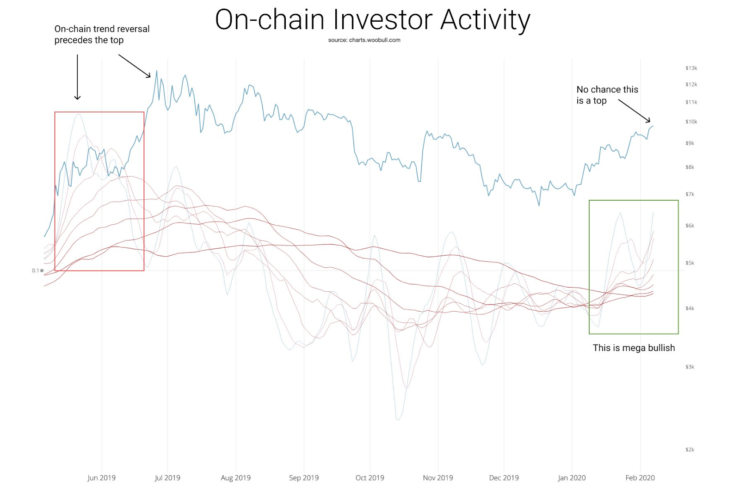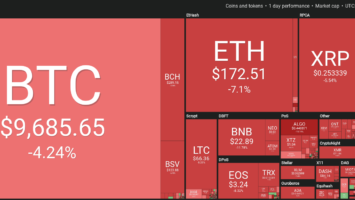Since Dec. 18, 2019, in less than three months, Bitcoin’s (BTC) price surged by 68% against the United States dollar. It surpassed the $10,000 level on Feb. 9, marking the start of a full-blown crypto market rally for most.
The sentiment around the recent Bitcoin rally remains divided amongst investors. Joe007, for instance, one of the biggest whales in the cryptocurrency market, has been adamant that the upsurge has been a result of pure manipulation.
Other investors like Adaptive Capital general partner Willy Woo and Three Arrows Capital CEO Su Zhu said that both fundamental and technical factors have supported the rally since the beginning. When Bitcoin’s price was hovering at around $7,000, Zhu noted that the premium of the BTC/USDT pair indicated an accumulation phase was starting particularly in Asia.
While the explanations for the recent Bitcoin upsurge vary, they ultimately can be narrowed down to three broad factors: accumulation since December 2019, on-chain data indicating a rise in investor activity and a possible manipulation by whales.
Factor #1: accumulation of Bitcoin since December 2019
On Dec. 28, 2019, Zhu stated that the BTC/USDT premium suggest investors were accumulating, and Bitcoin’s price could hit $9,000 by the end of January:
“BTC/USDT premiums and price action show clear signs of accumulation and money flow back into risk. Would not surprise me to see 9K+ before the end of Jan.”
At the time, Bitcoin’s price was hovering at $7,200, and at the end of January, as predicted by Zhu, its price peaked at $9,500. When the BTC/USDT pair was showing a premium over spot, it meant that the demand for Tether and Bitcoin was on the rise.
According to cryptocurrency research firm Diar, the majority of the on-chain activity of Tether in mid-2019 occurred in China. The volume of Tether coming from Chinese exchanges was substantially higher than exchanges in the West. The report read:
“On-chain data shows Tether movements hitting a new all-time-high for 2Q19 with one month left on the calendar for the period. What is most striking, however, is the volume coming in and out of Chinese exchanges dwarfs western and global trading venues and accounts for more than half of the total transaction value of known parties.”
Based on the premium of the BTC/USDT pair and China accounting for the overwhelming majority of Tether’s on-chain activity, it can be reasonably deduced that many investors in Asia were accumulating in the final months of 2019.
The gradual accumulation heading into 2020 was expected to be dominated by the narrative around the scheduled Bitcoin reward halving set to occur in May, established a strong foundation for an extended rally.
Factor #2: whale manipulation
Since Bitcoin’s price was in the mid-$9,000 range, Joe007 has consistently said that the rally is manipulated by fake buy walls and spoof orders. After Bitcoin’s price hit $10,000, the Bitcoin whale wrote:
“I’m all in for a good old BTC parabolic, but I’d like to cash out in the end. But it’s not possible if the price is pumped up by overleveraged players in the face of low liquidity and weak fiat inflow.”
The main argument behind Joe007’s statement is that the recent upsurge was triggered by other whales placing spoof orders across margin trading platforms to inorganically pump the price of Bitcoin up.
In margin trading, a spoof order is a fake buy order of a large size created to lead others into buying into the market with the intent of pushing the price up. When the price goes up, the order disappears, hence the term “spoof.”
While the Bitcoin rally started out as manipulation from whales, considering the consistency in the emergence of spoof orders every time the dominant cryptocurrency showed a sign of a pullback, it remains unclear whether the movement to $10,000 and above is also being manipulated.
Simply put, what began as manipulation can turn organic if retail investors start to get involved and invest into the market out of fear of missing out. Throughout the entire run from the low $8,000s to $10,000, short sellers continue to place pressure on the market with large sell orders in the $9,000-to-$10,000 range.
As Bitcoin’s price increased, it squeezed short contracts and pushed short sellers to market buy, which then turned into buying demand that further led BTC to spike. Speaking about Bitcoin reclaiming the psychological $10,000 level, a cryptocurrency analyst known as Light said:
“Markets seek liquidity. There are hundreds of millions in stops, liquidations and trigger orders hiding right above it. The prize is too great not to be taken. There is no real material sum of spot sellers who waited this long just to sell just before this leg’s climax.”
The lack of fiat inflow has been described as the missing piece of the upside movement of Bitcoin from the $6,000s to $10,000. But, in the past several days, exchanges like Binance have started to see some inflow that may provide BTC the basis it needs to initiate an extended upsurge.
Factor #3: rising on-chain investor activity
Willy Woo, who has created various indicators that take both fundamental and technical factors of Bitcoin into consideration to predict its trends, said that the chance of $10,000 being the top is basically zero. To explain the point, Woo showed a chart with the price of Bitcoin alongside on-chain investor activity.
Caption: Bitcoin on-chain investor activity. Source: Willy Woo Twitter
The Realised Value to Transaction Volume ratio, for instance, is used as a signal to find market bottoms and tops. When Bitcoin’s price reached $14,000 last year, the RVT ratio hit nearly 0.04. As of Feb. 10, the RVT ratio is hovering at around 0.018, which shows Bitcoin’s price is unlikely to have topped. The ratio peaked at 0.12 when Bitcoin’s price hit $20,000 in December 2017.
Could it be a mixture of all 3 factors?
The Bitcoin’s rally from $6,400 to $10,000 is likely to have begun as manipulation from whales, based on the frequency and the consistency of spoof orders. However, it might have picked up retail interest, especially as investors in Asia began to accumulate Bitcoin in anticipation of the block reward halving that will occur in about three months.
Although Bitcoin’s price is currently hovering at around $10,100, technical indicators do not show overbought conditions nor signs of a local top, which could allow BTC to move up further before it pulls back.




Comments (No)